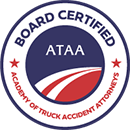When Are Large Trucks Most Likely to Lose Speed
Speed loss in large trucks leads to hazardous conditions for truck drivers and other drivers.
Causes of Large Trucks Losing Speed
Loss of speed for large trucks has several reasons. Some reasons are because of the roads and areas trucks navigate. Other reasons are driver-related actions, weather, and mechanical issues. Some common reasons for large trucks losing speed are:
Terrain
Among the reasons for speed loss is driving up or down hills and mountains. The weight and limited engine power of some large trucks makes quicker driving harder and more dangerous. Terrain in general poses difficulties for large trucks. Long, gradual curves and other road curves cause large trucks to lose speed.
Blind Spots
Blind spots are areas where trucks lose and should lose speed. A vehicle blind spot is a location outside the vehicle that the driver cannot see by looking in the side mirrors. Going fast in blind spots can lead to accidents.
Heavily Loaded or Overloaded Trucks
Trucks carrying heavier loads and operating near maximum weight limits are prone to losing speed. Speed loss with heavy loads is often during challenging conditions such as poor weather and road conditions like mountains, hills, and curves.
Mechanical Issues
Trucks can experience mechanical issues that affect their speed. Common mechanical reasons that cause trucks to slow down are fuel system issues, defective airflow that prevents correct air-to-fuel ratio, and ignition problems. Defective exhaust, spark plugs, and catalytic converters can be sources of trucks bogging down.
Driver Issues
Trucks lose speed when drivers are distracted, under the influence of substances, or experiencing driver fatigue. Distracted drivers may not notice they are in a different speed zone. For drivers who are driving under the influence (DUI), their sense of time may be skewed. Drivers who have gone without sleep may react slowly and drive slower.
Slowing Truck Road Consequences
Large trucks slowing, especially when the deceleration is sudden, can cause damaging accidents to property and life. The main hazard of large trucks losing speed is traffic accidents. Vehicles behind the truck may not be prepared for the truck’s reduction in speed. Some consequences of large trucks losing speed are issues such as traffic flow disruption. When a large truck slows down traffic is disrupted. Slower trucks especially affect traffic flow on single-lane highways. Traffic disruption makes congestion, delays, and accidents more likely. For example, traffic disruptions can cause rear-end collisions, chain-reaction pile-ups, and other collision hazards.
Another result of large trucks losing speed is infrastructure strain. Large trucks decelerating and accelerating, especially in urban areas, create wear and tear on roadways. Wear and tear increases infrastructure maintenance costs and leads to poor road conditions. Infrastructure strain includes decreased road capacity. Slower trucks lead to backups, difficulty in passing other vehicles, and increased accident risks. Poor road conditions lead to truck accidents that cause vehicle damage, injuries, and deaths.
Effects on Drivers
Loss of truck speed leads to effects on drivers. When traffic slows down, so does travel time. Increased travel time leads to driver fatigue and the hazards associated with distracted and tired driving such as collisions. Slowed trucks and traffic can lead to driver frustration, potentially causing reckless driving (road rage) with tailgating and aggressive overtaking. These can lead to serious accidents, including death and injuries. In driving and speed issues, truck drivers and other vehicle drivers share equal responsibility.
Finding representation after large truck accidents is necessary to ensure you receive the compensation you deserve. Trucking Injury Law Office is committed to justice by representing your rights in court. Contact us today.






